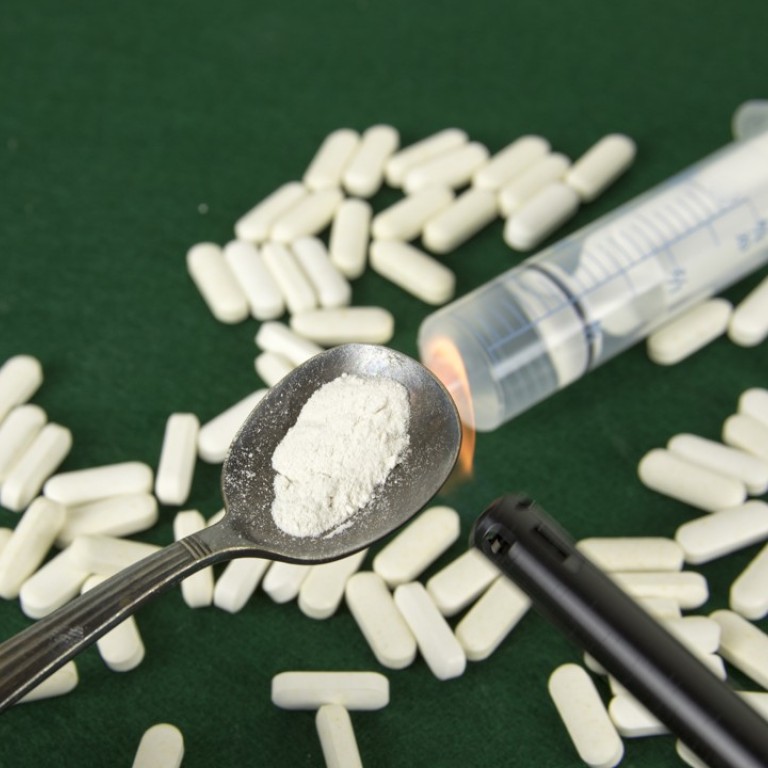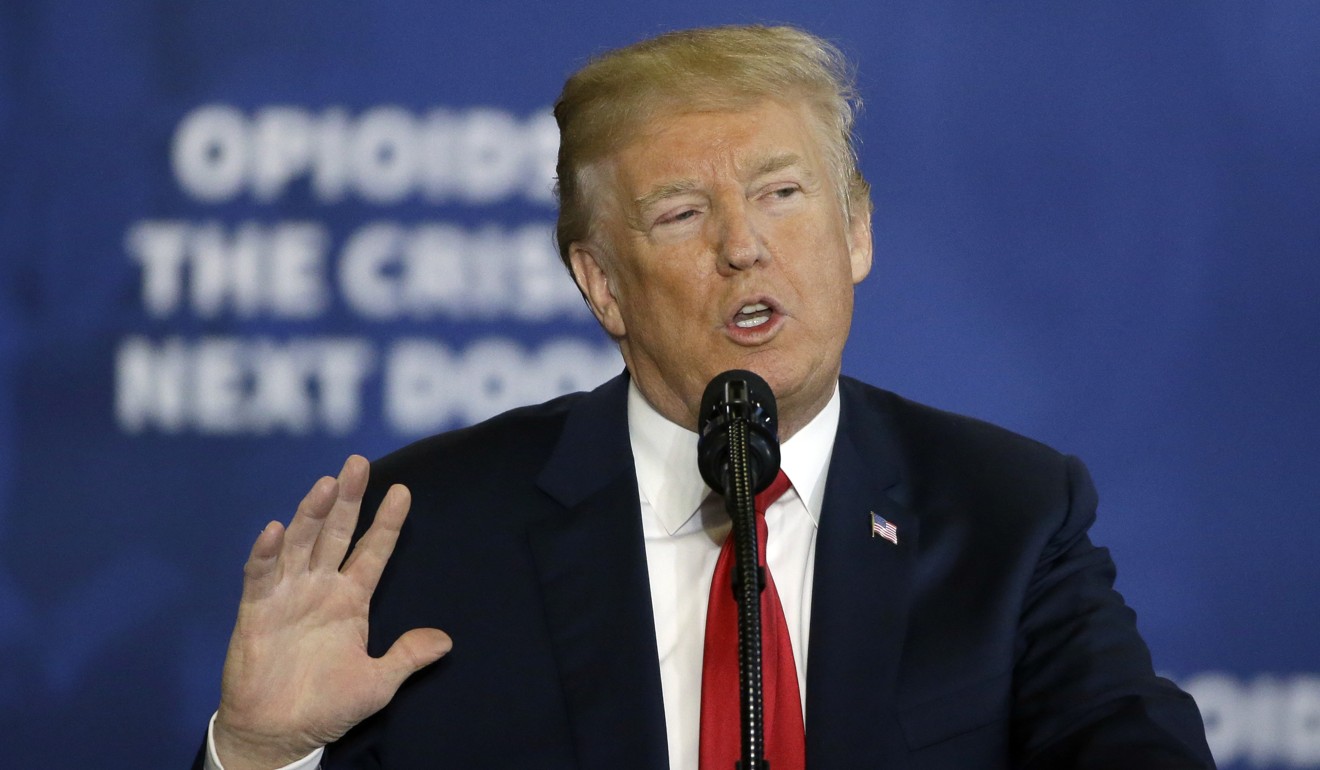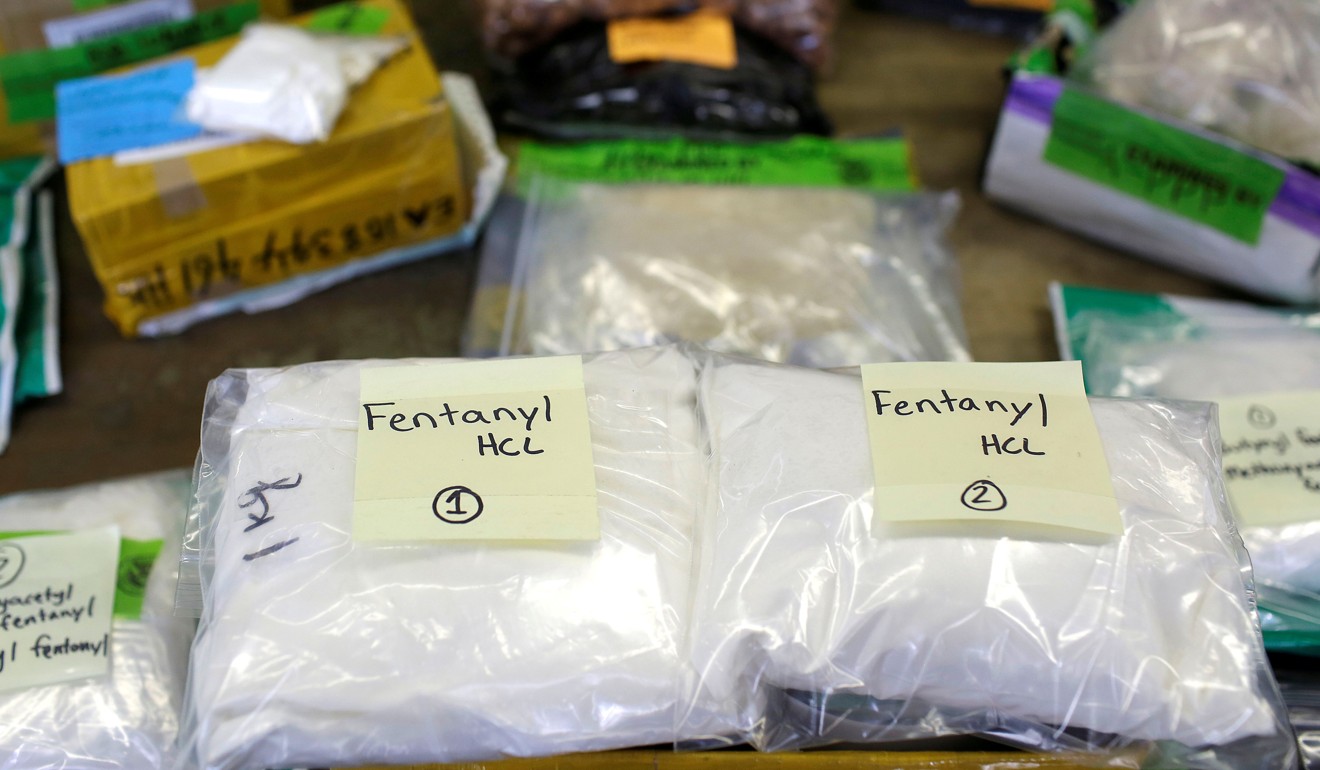
Collaboration key to solving China-fuelled opioid epidemic, US officials say
Testifying at House hearing about ways to reduce imports of fentanyl, law enforcement officials avoid the tough talk used by Donald Trump
United States law enforcement officials reaffirmed the Trump administration’s claim on Thursday that synthetic opioids produced in China are fuelling an opioid epidemic in the US responsible for the deaths of tens of thousands of people every year.
At the same time, though, they took pains to distance themselves from some of the recent heated talk on the issue and expressed cautious optimism that collaboration between US and Chinese drug control agencies would help counter the crisis.
Fentanyl, a synthetic opioid around 50 times more potent than heroin, is being “shipped into the US via postal or express mail from China”, said Paul Knierim of the US Drug Enforcement Administration (DEA), speaking at a hearing convened by the House of Representatives’ Foreign Affairs subcommittee.
Knierim, the deputy chief of operations at the DEA’s Office of Global Enforcement, cited the influx of synthetic opioids like fentanyl from China – as well as Mexico – as the primary reason behind the increase in opioid overdoses the US has witnessed in recent years.
Overdoses in the US attributable to fentanyl more than doubled between 2015 and 2016 to almost 19,500 deaths, compared to an overall rise in drug overdoses of 21 per cent over the same period, according to statistics from the National Centre for Health Statistics at the Centers for Disease Control and Prevention.
Last year saw the drug kill roughly 29,500 people in the US, close to double the number of people who died from heroin overdoses.

Knierim’s remarks came as lawmakers in Washington are seeking to push through new legislation that would strengthen screening controls of international packages arriving into the US to counter the influx of controlled substances and materials deemed a threat to national security.
The Synthetics Trafficking and Overdose Prevention Act of 2018 (STOP Act), which passed the House in June 14 and awaits Senate approval, would require that incoming packages arriving via the US Postal Service are accompanied by advance electronic information detailing their contents.
The act also lays out provisions for the US to provide technology to foreign entities to strengthen their outgoing postal-screening processes.
But government witnesses at Thursday’s hearing also struck a less confrontational tone than high-level remarks made between Washington and Beijing in recent weeks, led by a strongly worded statement US President Donald Trump issued on Twitter.
“It is outrageous that Poisonous Synthetic Heroin Fentanyl comes pouring into the US Postal System from China,” Trump tweeted on August 20, before calling on the Senate to approve the STOP Act as soon as possible.
Those remarks were shot down by senior voices within China’s National Narcotics Control Commission (NNCC), with commission member Yu Haibin calling them “completely unacceptable” and “irresponsible”, according to CNN.
“The United States has no proof that most fentanyl in the country comes from China,” CNN quoted Yu as saying. “It’s highly irresponsible to draw such a conclusion based on some individual cases.”
At Thursday’s hearing, government witnesses went out of their way to emphasise the existence of meaningful collaboration between the two countries’ governments, playing down confrontational dialogue.
There are “plenty of red points” in the rhetoric between the two governments, Kirsten Madison of the Bureau of International Narcotics and Law Enforcement Affairs (INL), acknowledged.
“But as long as we’re getting the cooperation we need out of [China], that’s the most important thing,” said Madison, assistant secretary at the INL, a State Department agency.
Madison added that Chinese authorities were working collaboratively with their US counterparts on real-time law enforcement, the advancement of electronic data systems in shipping, and controls over more substances.

On August 29, China’s NNCC announced the inclusion of 32 new psychotic drug substances in the country’s list of controlled substances, bringing the total to 175.
Also suggesting efforts to reduce the confrontational tone, the title of Thursday’s hearing was changed in the days before the event from “Tackling Fentanyl: Holding China Accountable” to “Tackling Fentanyl: The China Connection,” a web archive showed.
In June, the NNCC’s deputy head, Liu Yuejin, said that the US domestic market, rather than Chinese suppliers, was at the heart of the country’s opioid crisis, though he emphasised his agency’s commitment to collaborative efforts to stifle the transcontinental supply chain.
Despite those efforts, and despite fentanyl’s inclusion on China’s list of controlled substances, suppliers of the drug can still be readily located with relative ease.
An online search on Thursday for fentanyl providers based in China returned a number of vendors apparently capable of shipping synthetic opioids abroad.

One company called Angel Pharmaceutical, whose website states it is based in Shanghai, purports to offer fentanyl to international sellers at over 99 per cent purity, along with scores of other drugs such as oxycodone and methylone.
Offering the product for “chemical research”, the company says it can produce up to 500 kilograms of the synthetic opioid a month, and ships globally through a number of carriers such as EMS, UPS and FedEx.
When contacted early on Friday morning, a company representative said that they produced the fentanyl in their own lab, and that one kilogram of the opioid would cost a customer US$5,500.
One kilogram of fentanyl can produce as much as US$1.5 million in revenue on US streets, according to the DEA.

